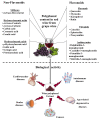Polyphenol Extracts from Red Wine and Grapevine: Potential Effects on Cancers
- PMID: 30453669
- PMCID: PMC6313659
- DOI: 10.3390/diseases6040106
Polyphenol Extracts from Red Wine and Grapevine: Potential Effects on Cancers
Abstract
Wine has been popular worldwide for many centuries and currently remains an important component of our diet. Scientific interest in wine and its health effects has grown considerably since the 1990s with the emergence of the "French Paradox" concept, correlating moderate wine consumption, a characteristic of the Mediterranean diet, and low incidence of coronary heart diseases. Since then, the positive effects on health, health promotion, disease prevention, and disease prognosis of moderate wine consumption, in particular red wine, have been attributed to its polyphenolic compounds such as resveratrol, quercetin, and other flavonoids acting as antioxidants. Several epidemiological, in vivo and in vitro, studies have reported that moderate red wine or red wine polyphenolic extract consumption may be active in the prevention and treatment of chronic diseases such as cardiovascular disease, metabolic syndrome, degenerative pathologies, and cancer. The aim of this review is to summarize the current findings about the effects of red wine polyphenols on cancer and to discuss how the polyphenolic composition of red wine may influence its chemopreventive properties.
Keywords: cancers; colorectal; polyphenols; red wine.
Conflict of interest statement
The authors declare no conflicts of interest.
Figures


References
Publication types
LinkOut - more resources
Full Text Sources

